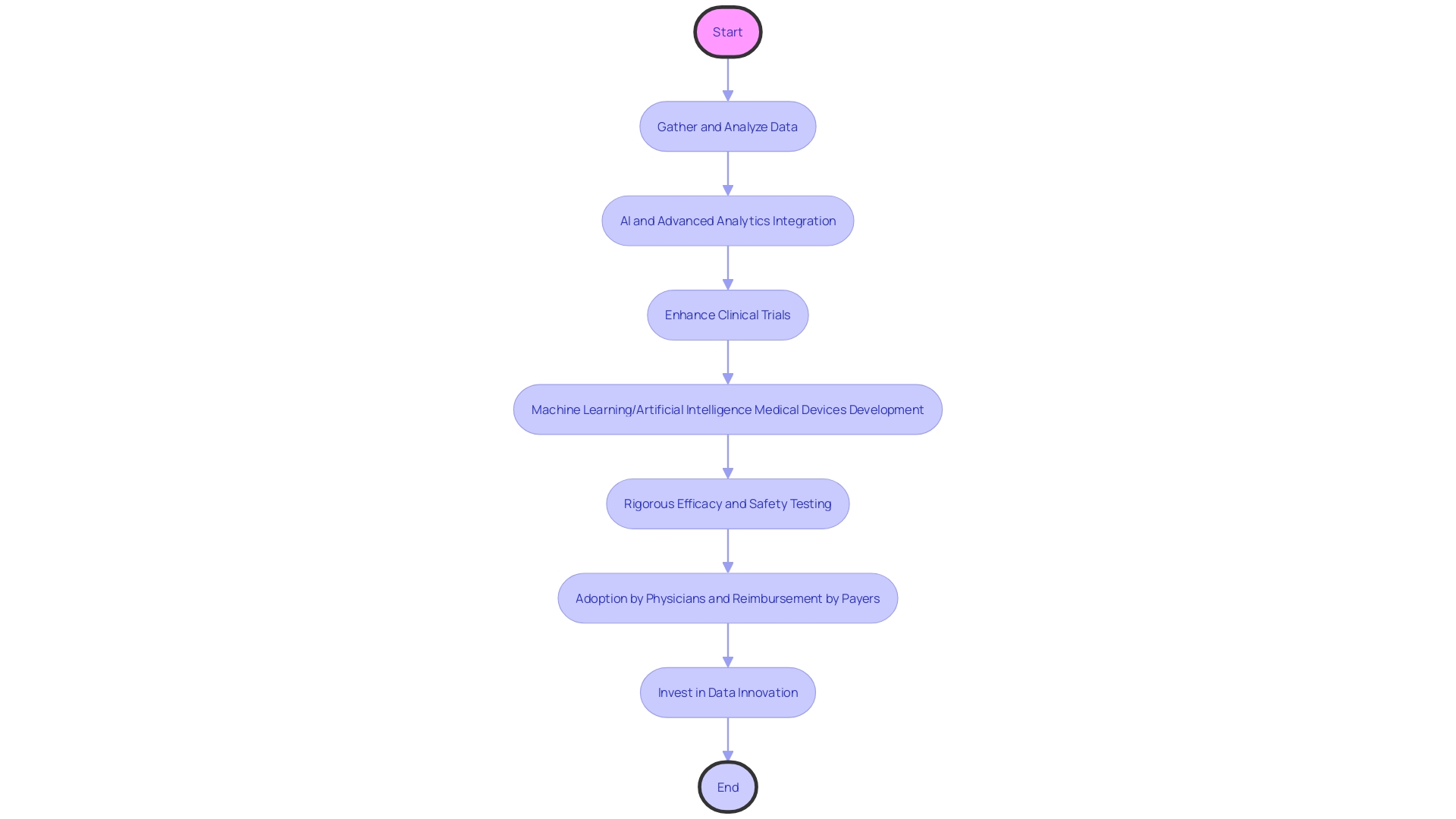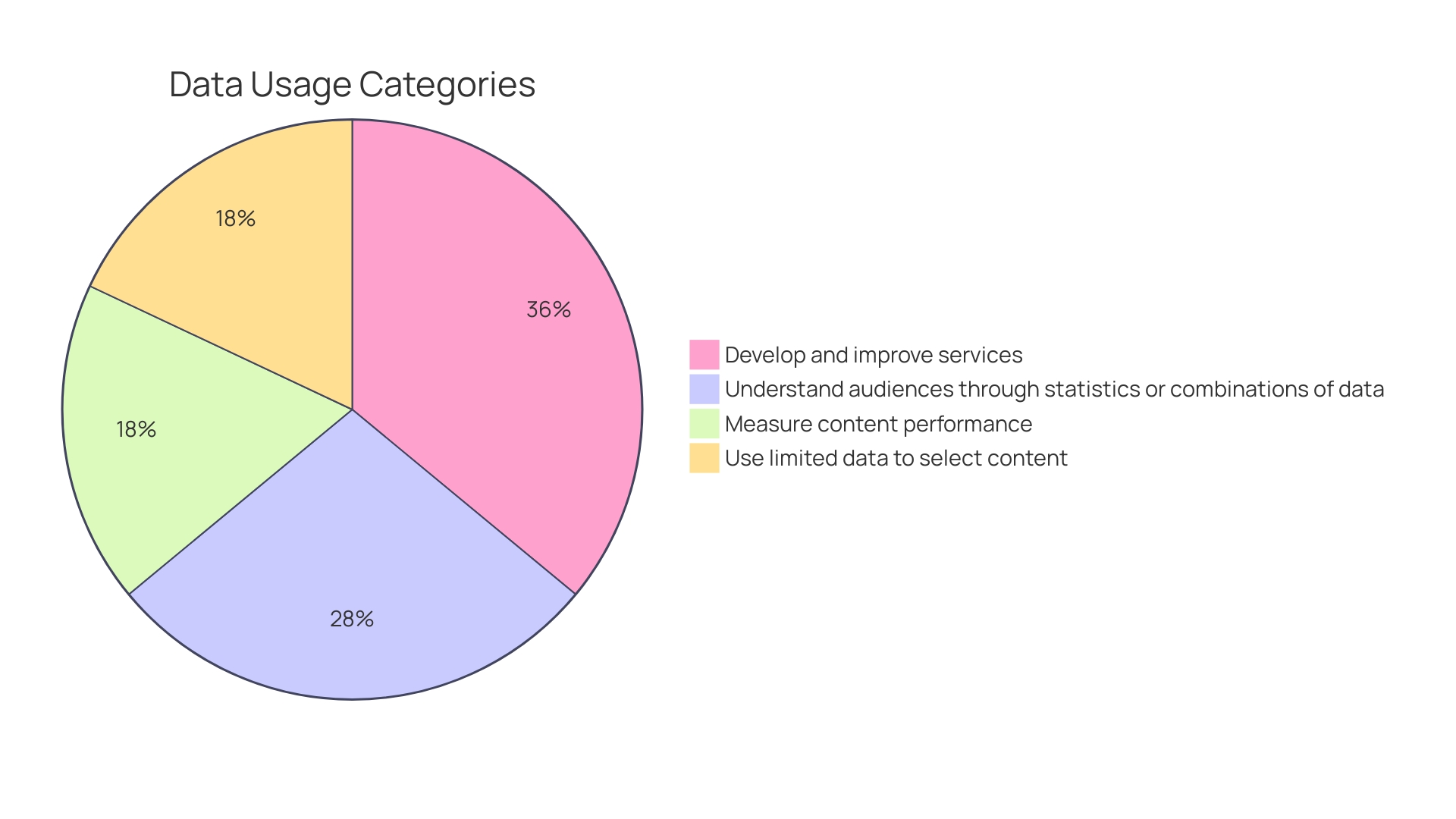Introduction
The pharmaceutical industry is undergoing a transformative period, driven by the need for innovation and improved patient care. However, drug discovery and development processes, such as clinical trials and early R&D, are often time-consuming and costly. To address these challenges, pharmaceutical entities are turning to artificial intelligence (AI) as a strategic solution.
By leveraging AI, processes can be streamlined, timelines can be shortened, and financial burdens can be alleviated. The integration of AI and advanced analytics is not just a trend in the industry; it is a strategic imperative that promises to reshape drug development and improve precision in targeting patient populations. From refining trial eligibility criteria to revolutionizing diagnostic accuracy in fields like cardiology, the potential of AI in the pharmaceutical industry is vast.
This article delves into the challenges faced by the industry, the implementation of analytics solutions, key use cases in pharma, the data-led transformation, and the impact and results of analytics. It also highlights lessons learned and best practices for organizations navigating their analytics journey in the pharmaceutical industry. As the industry continues to evolve, the strategic use of data and analytics will be a fundamental driver of innovation and efficiency.
Case Study Overview
The pharmaceutical industry is in a constant state of flux, with innovation being the cornerstone of competitiveness and enhanced patient care. In the intricate dance of drug discovery and development, clinical trials and early R&D emerge as pivotal yet financially onerous steps. These phases, fraught with complex protocols and data analysis, traditionally bleed billions of dollars annually and extend the time to market.
It's imperative that pharmaceutical entities sculpt a more integrated and strategic modus operandi for amassing essential drug development data. Leveraging artificial intelligence (AI) can streamline processes, shrink the timelines from patient's last visit to data submission from months to days, and alleviate financial burdens.
A staggering $2.6 billion and up to 15 years are estimated to be the cost of bringing a new drug from conception to the pharmacy shelf, according to the Pharmaceutical Research and Manufacturers of America. The lengthy and costly journey is driving pharma companies to adopt technologies like Generative AI (GenAI) to expedite drug development, particularly in the domain of clinical trial protocols.
The Food and Drug Administration's approval of 55 drugs in 2023 underscores the potential rewards of this arduous process. Refining trial eligibility criteria is a case in point; it's a delicate balance between inclusive and exclusive parameters that affects participant enrollment, trial variability, and management overhead. AI steps in to estimate eligible patient populations and refine these criteria, thereby streamlining the trial process.
In the world of cardiology, the application of AI has revolutionized the field, offering new perspectives and reducing the pressure on medical professionals to make timely, accurate diagnoses. This transformation is indicative of Ai's broader impact on medical fields, increasing the efficiency of manual processes and improving patient outcomes.
For the pharmaceutical industry, the pivot to AI and advanced analytics is not merely a trend; it's a strategic imperative. It promises to reshape the landscape of drug development, from enhancing the precision in targeting patient populations to navigating the complex web of stakeholders, including patients, physicians, and insurance companies.

Challenges Faced by the Pharma Industry
The pharmaceutical industry is navigating a period of intense transformation, with a bevy of challenges including intricate regulatory landscapes, escalating research and development expenditures, and stiffening competition. By examining the insights from Cardinal Health's work on investigational drug applications or the advancements made by enterprises in embedding analytics into strategic planning and decision-making, it's clear the sector is on a cusp of a data-driven revolution. This change is further underscored by the Association of the British Pharmaceutical Industry's data, which shows the daunting resource investment required to bring new medicines to market.
Moreover, recent regulatory updates from the European Union and global pushes towards sustainable procurement, as articulated by Syngene, are reshaping the industry's framework. With an eye on the horizon, it's imperative for pharmaceutical entities to scrutinize the emerging technologies and regulatory shifts anticipated in the upcoming year. These insights, coupled with an understanding of macroeconomic trends and stakeholder preferences, will be instrumental in crafting strategies that harness the dynamic nature of drug value over its lifecycle, ensuring a competitive edge in this rapidly evolving domain.
Implementation of Analytics Solutions
In the pharmaceutical industry, companies face the intricate challenge of ensuring drug efficacy while managing costs and adhering to stringent regulations. Analytics solutions have emerged as a pivotal tool to address these complexities, particularly in optimizing clinical trial processes. For instance, analytics can refine eligibility criteria for clinical trials, with AI estimating the number of eligible patients based on specific criteria.
This precision minimizes variability and management costs, striking a balance between niche and broad criteria to ensure adequate trial enrollment.
The role of analytics stretches beyond trial optimization to the broader landscape of medical fields, such as cardiology. AI advancements have revolutionized diagnostic accuracy by analyzing data from medical devices like ECGs and CT scans—capabilities that surpass human limitations and provide cardiologists with invaluable insights, thus reducing diagnostic pressure and uncertainty.
Furthermore, in an industry where customer decision-making is multifaceted, involving patients, physicians, and insurance companies, analytics solutions can dissect the long and fuzzy process tied to prescription events and sales campaigns. This is crucial, especially as pharma targets smaller patient populations in precision medicine and rare diseases, where data samples are inherently limited.
Recognizing the potential of analytics, the healthcare industry has accelerated its adoption, particularly during the pandemic, to streamline drug development and patient care. As such, the integration of analytics in pharma not only respects the need for data privacy and security but also represents a transformative step towards more personalized, efficient, and cost-effective healthcare solutions.
Key Analytics Use Cases in Pharma
The transformative power of analytics in the pharmaceutical industry is reshaping the landscape of drug development and patient care. By harnessing the power of data, pharma companies can expedite the journey from laboratory breakthroughs to life-saving drugs. This evolution is evident in several areas, including the streamlining of clinical trials, enhancement of supply chain efficiencies, and the birth of personalized medicine.
Clinical trials, the cornerstone of drug development, are notorious for their complexity and lengthy timelines. However, with advanced analytics, the industry is witnessing a reduction in the time and costs associated with these trials. Artificial intelligence (AI) is particularly promising, as it can minimize the friction between steps such as protocol design, site recruitment, patient enrollment, and data collection.
Implementing AI has shown potential to shrink the data delivery window to regulatory bodies from months to mere days, revolutionizing the speed at which drugs can reach the market.
In the realm of supply chain management, analytics provides a clearer vision of production processes, akin to the substantial efforts made by the US Army to scale up penicillin manufacturing. Today's analytical tools help identify bottlenecks and predict supply chain disruptions, ensuring that medications reach those in need without delay.
Furthermore, the emergence of personalized medicine has been buoyed by analytics, allowing treatments to be tailored to the unique genetic makeup of individual patients. This level of customization not only improves patient outcomes but is also revolutionizing the approach to treating rare and orphan diseases.
As the industry navigates the complex interplay between patients, physicians, and insurers, analytics serves as a beacon, guiding pharma companies through the intricate decision-making process. The deployment of AI and machine learning is not only refining current practices but is also crafting a future where medical interventions are more precise, efficient, and impactful.

Data-Led Transformation in Pharma
The pharmaceutical industry is on the cusp of a data-driven renaissance, with advanced analytics reshaping the very fabric of decision-making processes. The integration of machine learning and artificial intelligence into the sector is not only enhancing the ability to sift through massive datasets but is also providing a granular understanding of complex patterns and trends that were previously inaccessible. For instance, the use of generative AI has been a game-changer, potentially unlocking billions in value by accelerating drug development timelines.
The McKinsey Global Institute estimates that AI could generate between $60 billion to $110 billion annually for the pharma and medical-product industries. Such technological leaps in AI are exemplified by tools like AlphaFold2 and ESMFold, which employ deep learning to predict protein structures, thereby deepening our comprehension of diseases.
In the realm of cardiology, AI advancements have significantly lessened the burden on medical professionals, aiding in more accurate diagnostics and treatment options. This not only helps in reducing the stress and uncertainty faced by cardiologists but also potentially improves patient outcomes during critical health episodes. Moreover, the introduction of frameworks for data access and transformation in biopharmaceutical manufacturing ensures that information utilized for operational decisions is reliable, fostering a collective trust across the development spectrum.
However, the journey towards digital transformation in pharma is not without its challenges. The decision-making process is often complicated by the unique interplay between patients, physicians, and insurance companies. Additionally, the targeted populations for pharmaceuticals, particularly for precision medications and treatments for rare diseases, are often small, making data-driven decision-making more complex due to limited sample sizes.
Furthermore, the heavily regulated nature of the industry imposes additional hurdles in content creation for promotion.
Despite these challenges, early digital adoption in process development, manufacturing, and quality assurance has shown promise in overcoming traditional bottlenecks. By integrating information flow, manufacturing, and automation, digital solutions are streamlining the commercial production process, thereby delivering more economical and efficient outcomes. As the sector advances, it's clear that the strategic use of data and analytics will continue to be a fundamental driver of innovation and efficiency in the pharmaceutical industry.
Impact and Results
The pharmaceutical industry has been revolutionized by the application of analytics, particularly in refining the eligibility criteria for clinical trials. These trials are a balancing act, requiring criteria that are neither too narrow—risking insufficient enrollment—nor too broad—leading to increased variability and management costs. Advanced analytics, through AI, now estimate the eligible patient population more accurately, streamlining the trial process and improving efficiency.
In cardiology, a field marked by the high stakes of accurate diagnosis and treatment, AI has played a transformative role. By reducing the pressure and uncertainty faced by cardiologists, AI aids in ensuring that patients receive the right treatment at the right time, enhancing patient outcomes significantly.
Moreover, drug discovery, often a laborious and expensive process, has been accelerated by machine learning. By automating the analysis of large volumes of experimental data, such as microscope images, machine learning enables faster and more accurate identification of potential drug candidates, ultimately speeding up the time-to-market for new medications.
An example of industry synergy comes from Vertex Pharmaceuticals, whose collaboration with software and cloud architecture directors has led to breakthroughs in operational efficiency. The establishment of an enterprise analytics team, tasked with integrating analytics into strategic planning and decision-making, has improved not only clinical outcomes but also financial performance.
A case study involving Cardinal Health illustrates the complexity of challenges overcome through analytics in the pharmaceutical realm. The successful navigation through regulatory mazes for investigational drug applications is a testament to the power of comprehensive analytics strategies.
In the context of sales and marketing, the unique decision-making process in the pharmaceutical industry involves multiple stakeholders, including patients, physicians, and insurance companies. Analytics has reshaped how these stakeholders interact and make decisions, factoring in the complexity of regulations and the uniqueness of pharmaceutical markets, especially those involving precision medications and rare diseases.
Looking ahead, the next 12 months promise to be pivotal for the biopharmaceutical industry, with anticipated regulatory approvals and drug launches. Stakeholders, including suppliers and technology vendors, must stay abreast of emerging trends and regulatory shifts to maintain a competitive edge. The integrated use of analytics will continue to be crucial in navigating these developments, assuring the delivery of new medicines to patients in a timely and cost-effective manner.

Lessons Learned and Best Practices
The pharmaceutical industry is rapidly embracing the power of digital transformation, with artificial intelligence (AI) at the forefront of this evolution. The successful implementation of AI in pharma is not just about technological innovation; it's about reshaping the way trials are conducted, diagnoses are made, and treatments are developed. For instance, AI has significantly impacted cardiology, transforming diagnostic processes and patient care.
In the realm of clinical trials, refining eligibility criteria is a prime example of the benefits AI can provide. The delicate balance between specificity and inclusivity in participant selection can make or break the success of a trial. AI assists in estimating the number of eligible patients, thereby optimizing the criteria to ensure an adequate and manageable cohort.
Understanding the unique intricacies of the pharma customer decision-making process is another crucial aspect. This involves considering the perspectives of patients, physicians, and insurance companies. With Ai's propensity modeling and machine learning capabilities, it's possible to gain deeper insights into stakeholder behaviors, despite the challenge of smaller target populations in fields like precision medicine and rare diseases.
Moreover, aligning strategic objectives with governance is essential. As highlighted by industry leaders, the synergy between C-level executives and data scientists sets the stage for AI-driven success. Identifying data flow patterns within the organization allows for early interventions and showcases immediate value, which is especially important given the regulatory challenges in pharma.
The industry's shift towards patient-centered drug development, supported by connected devices and decentralized trial solutions, underscores the value of comprehensive data strategies. Such strategies must be in place before trial protocol design to efficiently manage and analyze the wealth of data from both traditional and digital sources.
By acknowledging these insights and best practices, organizations can navigate their analytics journey in the pharma industry with greater confidence, aiming for enhanced patient outcomes and streamlined operations.
Conclusion
In conclusion, the pharmaceutical industry is undergoing a transformative period driven by the need for innovation and improved patient care. AI and advanced analytics are strategic solutions that streamline processes, improve patient outcomes, and maintain a competitive edge.
Analytics solutions in the pharmaceutical industry optimize clinical trials, refine eligibility criteria, and revolutionize diagnostic accuracy in fields like cardiology. They also enhance supply chain efficiencies and enable personalized medicine.
The integration of AI and advanced analytics accelerates drug development timelines, provides a granular understanding of complex patterns and trends, and improves decision-making processes. Despite challenges, early digital adoption in process development and manufacturing shows promise in overcoming traditional bottlenecks.
Lessons learned and best practices include optimizing eligibility criteria, understanding the pharma customer decision-making process, aligning strategic objectives with governance, and implementing comprehensive data strategies.
In summary, the strategic use of data and analytics drives innovation and efficiency in the pharmaceutical industry. By leveraging AI and advanced analytics, pharmaceutical entities can streamline processes, improve patient outcomes, and stay ahead in this rapidly evolving domain.





